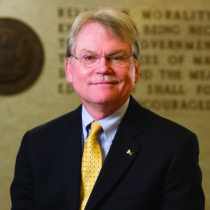Magazine

The Past Speaks in Two Voices
by Terrence J. McDonald, Director
As many Collections readers know, I have decided to leave the Bentley at the end of the summer and transition to the LSA Department of History and my original job as a professor of history there.
I am making this change despite the fact that, as I have joked before, “being an historian is the hardest job in the world.”
The past always “speaks” to us in two voices. One voice says, “Things were different here”; the other voice says, “The origins of the present will be found here.”
Both are actually true. Our whole approach to hearing those voices can change, too, when new historical sources are revealed or new approaches to the past are proposed.
Keeping all these things in balance is what makes it hard—for anyone—to study or write history. But that’s also what makes it incredibly exciting.
The solution to these challenges is found, significantly, in the archives. And that is why places like the Bentley are so crucial to our future: They house the “voices” from the past that we need to hear.
Here’s an example of this.
During the University’s 2017 Bicentennial Year, Professor of History and Afroamerican and African Studies Angela Dillard asked the Bentley a pretty simple question: Who was the 100th African American to attend the University of Michigan? She well knew, as we all do, the “firsts” in various fields or places at the University. But what happened after that?
We could not answer her question, but we set out to do so. In March 2022, the first stage of results from that work appeared in a new Bentley website called the African American Student Project, well described in the article by Brian Williams, the archivist who led the project, on page 22 of this issue.
With some qualifications, we can now say that the 100th African American student at Michigan was Oscar Baker, a Bay City, Michigan, native who graduated from the U-M Law School in 1902, and who went on to a very distinguished legal career in the state.
But there are also now more than 3,295 other African American students in the first version of our database, which will grow over time. Given these numbers, we now can see patterns that move us decisively beyond the framework that simply celebrates the “firsts.”
Other information on the website suggests that African American students had a hard time finding housing in the community. That problem was not solved when the first dormitories opened on campus because those dorms were racially segregated—if not on paper, certainly in practice.
However, African American students, organizations, parents, and alumni pressed the University to change, and improvements were made over time.
In fact, our 100th student, Oscar Baker, returned as the attorney who represented the family of admitted nursing student Marjorie Franklin. In 1925, Franklin challenged the University system that segregated the special dormitory for nursing students.
And so the focus of our historical work changes: a new question is asked; the answer is sought; new records are revealed.
In this case, we will never be satisfied with a focus on the “firsts” again.
It has been a wonderful privilege to be on the front lines of managing these archives. Now, however, I am excited to return to the status of archives “user” along with so many of you.
